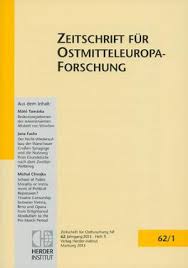Auswärtige Nationalitätenpolitik. Der konsularische Dienst Polens und die nationalen Minderheiten (1918-1939)
Foreign Nationality Policy. The Consular Service of Poland and the National Minorities (1918-1939)
Author(s): Wojciech SkóraSubject(s): Jewish studies, Political history, Pre-WW I & WW I (1900 -1919), Interwar Period (1920 - 1939), Inter-Ethnic Relations
Published by: Verlag Herder-Institut
Keywords: Foreign Nationality Policy; Consular Service of Poland; National Minorities (1918-1939);
Summary/Abstract: The Second Republic of Poland was a multinational country. Hundreds of thousands of Polish citizens who did not consider themselves Polish remained beyond Poland’s borders. The consular service was formed to protect the rights of Polish citizens and carry out the Polish government’s nationality policy. Many subtle and complicated activities resulted from efforts to realise the conflicting assumptions behind “official Polish foreign nationality policy”. In 1923 the consular network consisted of 54 independent offices and 18 consular departments at diplomatic missions. In the middle of 1939 Poland already possessed 85 permanent consular institutions in which 573 office workers were employed (134 honourable consulates complemented these). The task of the consular service towards citizens of non-Polish nationality was to observe their clusters carefully. Action was taken only towards Jewish citizens, with interest in this group increasing after 1933. Consuls sought ways of using these networks for propaganda purposes. Attempts to approach Jewish emigration circles were surely a consequence of the Polish authorities’ desire to gain political influence on Polish emigration as a whole. These Consular service activities met with favourable responses. The increase in anti-Semitic feeling induced Polish Jews to manifest loyalty towards the Republic of Poland. For example, Jewish circles, especially in the United States, highly valued the activities of Polish consulates in Germany to oppose repressive Nazis’ measures. The consular service paid less attention to Polish citizens of Ukrainian nationality than to Jews. Co-operation with Ukrainian organizations was not taken up because apart from in a few exceptional cases. Poland was seen as an invader and enemy of Ukrainian national aspirations. Apart from matters concerning passports and visas, consulates of the Republic of Poland limited their activity to observing the clusters of Ukrainian emigrants and to propaganda activities. In the latter field efforts focussed on inspiring press articles explaining the conduct of the Polish authorities or countering Ukrainian polemics. The Consular service’s activities in relation to passports and visas impacted Poland’s international image unfavourably, and at the same time, did not essentially change the internal situation of the state. Re-emigration of Jews or Ukrainians to Poland was not significantly decreased. However, the attitude of these groups towards the country of Poland deteriorated. The new restrictive citizenship law passed in 1938 had a significant negative impact on Poland’s image in the opinion-forming Jewish circles of western countries.
Journal: Zeitschrift für Ostmitteleuropa-Forschung
- Issue Year: 62/2013
- Issue No: 2
- Page Range: 206-239
- Page Count: 27
- Language: German

